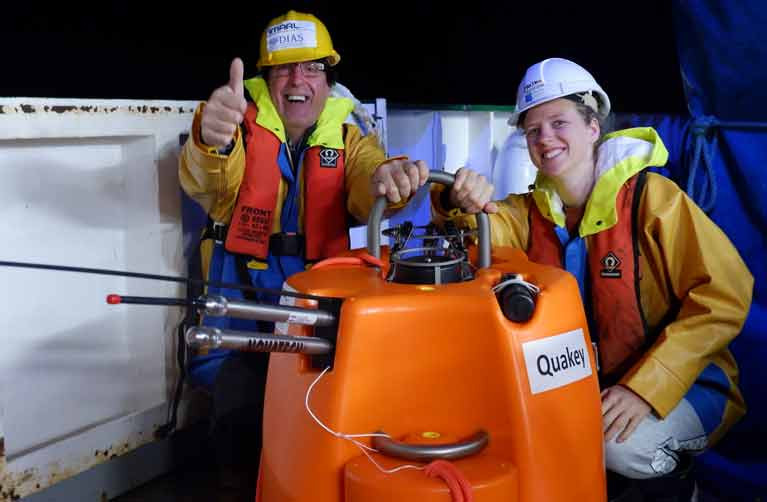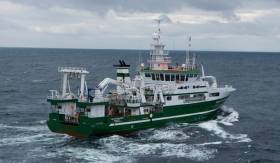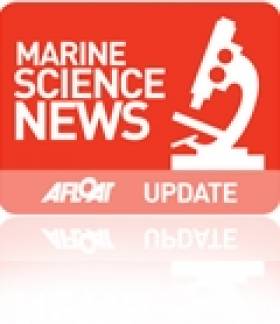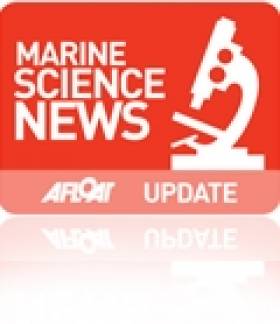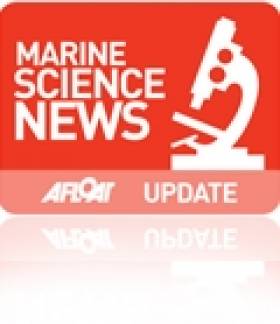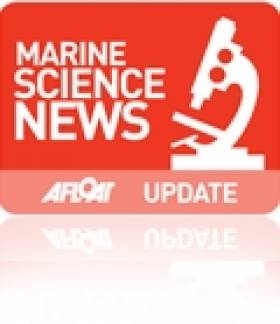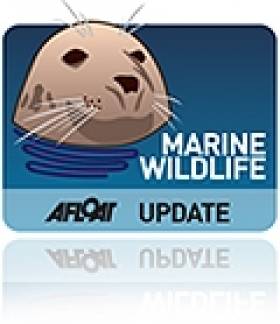Displaying items by tag: Celtic Explorer
The Raven Kaster, an educational “miniboat”, has been relaunched off Mayo’s Achill island from the Marine Institute’s Celtic Explorer.
The mini boat has been upgraded with solar-powered GPS tracking and new technology since its last voyage and has been set up to collect critical ocean data, including air and water temperature, to contribute to marine science education and research.
The Raven Kaster was first launched off Newfoundland’s Grand Banks in 2018 and was swept into Achill Island in Storm Erik.
 The 1.5m long miniboat was deployed into the Atlantic Ocean near the M6 Weather Buoy
The 1.5m long miniboat was deployed into the Atlantic Ocean near the M6 Weather Buoy
It was washed up on Dookinella beach on Achill island after 102 days at sea, and found in February 2019 by local fisherman Darren Kilbane.
Canadian students Stephanie Evans and Kaitlyn Grandy of the Frank Roberts Junior High in Newfoundland who led the project back in 2018 travelled to Ireland last year, and worked with students at Coláiste Pobal Acla in Mayo to prepare it for a return to sea.
The 1.5m long miniboat was deployed into the Atlantic Ocean near the M6 Weather Buoy, during the AIMSIR (Atlantic In-situ Marine Scientific Infrastructure Replacement) survey last week.
This project is part of the non-profit organization Educational Passages, a US entity that leads the miniboat programme to provide students with hands-on learning experiences in oceanography, environmental stewardship, and global collaboration.
Congratulating the collaborative efforts of the students and the team at Educational Passages, Alan Berry, infrastructure manager at the Marine Institute said “the mini-boat project is a wonderful example of marine science literacy and citizen engagement with the oceans”.
“It supports the strategic objectives of the Marine Institute and the value of partnerships essential for sharing marine science with the wider community. For students in particular, this project provides an exciting way of seeing real life examples of how the ocean has an influence on all our lives, learning how the ocean influences our weather and climate, and the types of technology used," he said.
"Seeing the Raven Kaster relaunched by some of the same crew members that launched the Galway Sailor back in 2021, and from the same area, is a great connection for us all,” Cassie Stymiest, executive director of Educational Passages.
The Galway Sailor, a separate miniboat, was provided to Kilglass National School in County Galway, as part of Marine Institute’s Explorers education programme. It travelled 3,000 miles to the Lofoten islands where it was found in mid -2021.
. "The hard work of our students should be celebrated as they did such great work to upgrade the boat and connect with their peers," said Karen Lavelle of Scoil Pobal Acla. "Now the students can see their hard work in action and engage directly with the ocean and the technology that can truly help make a difference."
The project is supported by contributions from the Town of Conception Bay South, the Irish Embassy in Ottawa, the Marine Institute in Ireland, MakerBuoy, and other sponsors and partners.
"The relaunch of the Raven Kaster is an example of how students from Canada and Ireland can collaborate globally to learn more about our shared ocean environment," Thomas Sheppard, teacher at Frank Roberts Junior High, said.
"It is a project that shares more than just a miniboat but a history, culture and ocean,” he said."
"It is great to see the enthusiasm and dedication from students across borders working together on such an impactful project that emphasizes the importance of international cooperation in scientific endeavours," Eamonn McKee, Ambassador of Ireland to Canada, Jamaica, The Bahamas, and Antigua and Barbuda, said.
Students and the public are invited and encouraged to follow the voyage in real time via the Educational Passages website (educationalpassages.org/atsea).
The Raven Kaster miniboat’s course can be tracked here
More information and data is available here
The Bronze Famine Shoes, an iconic representation of Ireland’s historic Famine Heritage Trail will soon be making their way across the Atlantic Ocean to Canada aboard the Marine Institute’s Research Vessel Celtic Explorer. The symbolic sculptures, crafted by artist Alannah O'Kelly, pay tribute to the millions affected by the devastating Great Irish Famine of 1845-1852. The journey to Canada follows the launch of the Global Irish Famine Way, a project aimed at raising awareness about the significant historical event and its enduring impact on Irish communities worldwide.
The Bronze Famine Shoes serve as a powerful symbol of remembrance for the victims of the famine, and the forced migration of Irish people during that period. The decision to bring the sculptures to Canada highlights the shared history and cultural ties between Ireland and Canada, particularly the significant Irish diaspora in Canada. It presents an opportunity to engage Canadian audiences in meaningful conversations about Irish migration, resilience, and commemoration.
The Marine Institute is proud to partner with Strokestown House to bring the Bronze Famine Shoes to Canada aboard the RV Celtic Explorer. This collaboration combines the expertise of the Marine Institute in maritime research and cultural exchange with Strokestown House's commitment to preserving Irish heritage and fostering dialogue about the Great Irish Famine.
The RV Celtic Explorer is Ireland’s largest national research vessel and has played an essential role in fisheries surveys, seabed mapping, and oceanographic research for over 20 years. The vessel will travel to St. Johns, Newfoundland to mobilize for a significant survey along the western Greenland shelf as part of the Biological Carbon Export in the Labrador Sea (BELAS) survey. This international, collaborative, interdisciplinary survey is being led by the University of Galway with partners from Dalhousie University of Nova Scotia and Memorial University of Newfoundland, and is supported by Ship-time funding from the Marine Institute, the Canadian Research council, the Ocean frontiers Institute (Canada) as well as the Science Foundation Ireland Research Centre in Applied Geosciences, University College Dublin (iCRAG).
 Caroilin Callery of the Irish Famine Way with the replica Bronze Shoes that are to be transported and presented in Canada during a Marine Institute research trip Photo: Andrew Downes
Caroilin Callery of the Irish Famine Way with the replica Bronze Shoes that are to be transported and presented in Canada during a Marine Institute research trip Photo: Andrew Downes
Dr Rick Officer, CEO Marine Institute, expressed his honor in bringing the Bronze Famine Shoes to Canada aboard the RV Celtic Explorer. He stated that “This journey represents a powerful symbol of solidarity and remembrance, highlighting the enduring legacy of the Great Irish Famine and its impact on Irish communities around the world.”
The arrival of the Bronze Famine Shoes in St. Johns will be marked by the launch of the Global Irish Famine Way, and a series of events and exhibitions hosted by Dept of Foreign Affairs, Strokestown House, and their partners.
Irish Marine Research Vessels, the Celtic Voyager and Celtic Explorer Celebrated in 'Oceans of Learning' Programme
Oceans of Learning, a collaboration between the Marine Institute and Government departments and organisations across Ireland, this week focuses on Ireland’s national marine research vessels, the Celtic Voyager and Celtic Explorer.
The RV Celtic Voyager came into service in 1997 as Ireland’s first custom-built multi-purpose research vessel. Her purpose was to facilitate the sustainable development of the country’s vast marine resource.
In 2003, the RV Celtic Explorer was commissioned as Ireland’s first deep sea research vessel. At the time of its launch, the Celtic Explorer was the quietest research vessel in the world, meeting international underwater noise requirements essential for fisheries research.
Dr Paul Connolly, CEO of the Marine Institute said, “The Celtic Voyager and Celtic Explorer have been central to the Marine Institute’s work and research, enabling us as a nation to engage in high quality marine science and to actively contribute to international research programmes.
“The new national marine research vessel, RV Tom Crean, comes into service in 2022, replacing the Celtic Voyager. As we look forward to a bright future with the Tom Crean and Celtic Explorer, we take a moment to appreciate the legacy of the Celtic Voyager. The vessel has served us well over the past quarter of a century, providing marine scientists, researchers and crew members with many years of experience at sea, and enabling us to deepen our ocean knowledge.”
The RV Celtic Voyager replaced the 21 metre RV Lough Beltra, which had originally been a fishing trawler. Upgrading to a 31-metre research vessel was the beginning of a new era in marine science in Ireland, as the Marine Institute was able to provide a purpose built platform that could operate further out in Ireland’s ocean territory.
The research vessel has played an essential role in fisheries scientific research, and a vital role in seabed mapping in Irish waters, as part of the INFOMAR programme. More than 200 shipwrecks around the coast of Ireland including the RMS Lusitania, have been mapped by the Celtic Voyager. In 2007, the survey of Galway Bay revealed for the first time a detailed seafloor and geology of the bay, confirming the location of the Galway Bay Fault.
Over close to 25 years, the Celtic Voyager has completed more than 600 surveys, enabled more than 5,000 science days and sailed in excess of 400,000 miles.
The 65 metre RV Celtic Explorer is designed for fisheries acoustic research, oceanographic, hydrographic and geological investigations as well as buoy/deep water mooring and ROV (Remotely Operated Vehicle) Operations. The vessel has a maximum endurance of 35 days offshore and can accommodate up to 35 personnel, including 20-22 scientists.
Expeditions on the RV Celtic Explorer in Irish and international waters have resulted in many exciting discoveries - from deep-water shark nurseries, cold-water coral reefs, to hydrothermal vents fields in the mid-Atlantic.
As part of Oceans of Learning, the Marine Institute’s Voyages video series profiles the people whose work is intertwined with Ireland’s national research vessels. Voyages shares insights into the people behind the science of our seas – Dr Louise Allcock, Professor of Zoology at NUI Galway, and David O’Sullivan, INFOMAR Programme at the Marine Institute – modern explorers on a voyage of discovery to safeguard the ocean and our future.
The Oceans of Learning series on marine.ie offers online interactive activities, videos and downloadable resources all about our ocean. A #SeaToMe social competition will encourage people across Ireland to share what the sea means to them for the chance to win weekly prizes.
Through Oceans of Learning, the Marine Institute comes together with Government Departments and organisations across Ireland including Bord Iascaigh Mhara, Bord Bia, Met Éireann, Commissioners of Irish Lights and EPIC Irish Emigration Museum, to celebrate and highlight the vital role our ocean plays in all of our lives.
Loss Ness Mometer & Other Seismometers Retrieved by Dublin Institute of Advanced Studies Expedition
Marine Scientists on the RV Celtic Explorer have collected a network of seismometers recording valuable data over the past 19 months in Irish, British and Icelandic waters.
The 18 seismometers had been deployed in 2018 over a 1500 kilometre area from north to south and over 1,000 km of sea from east to west as part of a project run by the Dublin Institute of Advanced Studies (DIAS).
As Afloat previously reported, a “skeleton” team of six scientists and a small crew on the Marine Institute research vessel went to sea last month to retrieve them and returned to Galway this week after three weeks at sea.
Team leader Dr Sergei Lebedev, DIAS seismologist, said the data captured by the seismometers would “shed light on the nature, occurrence, and frequency of earthquakes off our coast, and is fundamental to our understanding of them”.
“The current nature and history of the ocean floor along Ireland's coast is key to our understanding of how the Atlantic evolved and is evolving, and this is important for better understanding both the natural hazards and natural resources offshore," he said.
"For example, slope failures triggered by earthquakes can generate tsunamis in the Irish offshore territory – the data will give us new insights into this hazard,” he said.
The expedition was “time-critical”, as there were fears the data would be lost if the sensors were not retrieved. Physical distancing measures as part of HSE guidelines on the Covid-19 pandemic were in place for the expedition, according to the DIAS team.
"The seismometers have waterproof memory sticks with recordings of earthquakes off the coast of Ireland. To date, these have been poorly understood, but we know they are generally larger than the ones Ireland has onshore. The new data will give us much greater insights into earthquake mechanisms and, also, into the structure of the Earth's interior,” Dr Lebedev said.
"The instruments have made continuous recordings from the last 19 months of the songs of the great baleen whales, including the blue, fin, humpback and North Atlantic right whales. These unique recordings will build our understanding of the migration patterns of the Earth's largest animals and their acoustic environment, known to be crucially important for them,” he said.
Before the seismometers were deployed in 2018, DIAS ran a competition inviting secondary school students to name each one. Suggestions included “The Dude”, “Gráinne”, “Luigi” and “The Loch Ness Mometer”.
During the retrieval expedition, the research team hosted live video links with school classes from St Francis National School in Wicklow, along with St Joseph's College in Tipperary, and a school in Calabria, Italy.
Ireland's national research vessel, the R.V. Celtic Explorer will set sail this evening from St. John’s, Newfoundland and Labrador, (8pm Newfoundland/11:30pm Ireland), where last June it launched the very first seabed mapping expedition under the Atlantic Ocean Research Alliance.
The survey takes place May 11-21 with graduate students and early career researchers representing Europe (Ireland), Canada and the United States joining a team of international experts to map some 12000km2 of un-surveyed seafloor from the deepest parts of the Atlantic Ocean. Ireland’s national seabed mapping programme, INFOMAR launched a travel bursary called the Atlantic Seabed Mapping scholarship, AtSeaMap, to help support student researchers to come onboard.
This is the fourth seabed mapping survey to take place under the Atlantic Ocean Research Alliance. Xavier Monteys, Geological Survey of Ireland, will lead a team of 12 international scientists, who will map a transect of the Atlantic seafloor between St. John’s, Newfoundland, and Galway, Ireland. Together they will investigate discoveries from previous expeditions,while training the next generation of young seabed mappers through an innovative series of ocean research training delivered on-board.
Koen Verbruggen, Director, Geological Survey of Ireland (GSI) and Dr Peter Heffernan, CEO Marine Institute, the partner organisations delivering the INFOMAR programme, welcomed the survey and the introduction of AtSeaMap.
Koen Verbruggen said: “The INFOMAR scholarship, supporting European, US, and Canadian student participation, is a key step towards developing expertise, sharing knowledge, and raising awareness of the integral role of the Atlantic Ocean in each and every one of our daily lives.”
Dr Peter Heffernan added, “The Atlantic Ocean influences our lives in many different ways from climate, environment, energy, transport, telecommunications, to food on our tables. It’s our maritime highway. Amazingly, we just don't yet have the roadmap. AtSeaMap provides a unique opportunity for students from Europe, Canada and the USA to be part of a significant initiative to begin to build comprehensive maps of the Atlantic Ocean. ”
The survey supports the Galway Statement on Atlantic Ocean Cooperation, the goals of which are to join the resources of its three signatories to better understand the North Atlantic Ocean, to promote sustainable management of its resources, and to promote citizens’ understanding of the Atlantic through ocean literacy.
Dr Heffernan, who is the coordinator of the Atlantic Ocean Research Alliance Coordination and Support Action, added: “This survey and those to follow will make a significant contribution towards delivering on commitments made in the Galway Statement and represent an important stepping stone to building a comprehensive mapping campaign for the Atlantic Ocean.”
The survey is called TRASNA, which is the Irish word for “crossing" and stands for Trans-Atlantic Survey North-Atlantic. The scientific team and students will blog about their experience on the RV Celtic Explorer on www.atlanticresource.org/aora/trasna where you can follow their progress across the Atlantic or use #TRASNA.
The early stage researchers joining the survey as part of the AtSeaMap initiative are Jamie Maxwell, National University of Ireland Galway, Ireland; Peter MacIntosh, Memorial University, Newfoundland and Labrador, Canada; and Rachel Wireman, College of Charleston, USA.
The Canadian Coast Guard vessel Louis St. Laurent will build on this work later this summer sailing from Halifax, Nova Scotia, Canada on 22 July and due to arrive in Tromsø, Norway 5 August.
The INFOMAR Atlantic Seabed Mapping scholarship, AtSeaMap, is funded by the Department of Communications, Energy and Natural Resources.
The Marine Institute is leading the Horizon 2020 funded project -The Atlantic Ocean Research Alliance Coordination and Support Action – to support the implementation of the Galway Statement, signed at the Marine Institute, Oranmore 24th May 2013.
Major Upgrade To Scientific Equipment On RV Celtic Explorer
#MarineScience - The marine research vessel Celtic Explorer is back in the water with a new suite of hydrographic and geophysical sonar systems.
According to the Marine Institute, the new instruments were installed during an extensive refit in the A&P yard in Falmouth, which began on 29 December under the supervision of P&O Maritime (Ireland) Ltd.
The main work carried out during the refit was the installation of state-of-the-art sonar systems for bathymetric mapping in deep and shallow waters, and the installation of a deepwater sub-bottom profiler.
Adjustments were also made to the hull to fit the Kongsberg EM302 multibeam system and an IXSEA Echoes sub-bottom profiler.
These systems will enhance the seabed mapping capabilities of the Celtic Explorer, with the EM302 echo sounder designed to perform mapping with high resolution and accuracy to depths of 6km. The sub-bottom profiler can operate at the same depths to examine and profile surface bedrock layers and sediments.
The vessel's drop keel has been fitted with an EM2040 multibeam system – the same as that fitted to sister vessel the Celtic Voyager last year – to carry out high resolution seabed mapping in shallower waters. The vessel's positioning and motion reference systems were also upgraded to the highest standard to allow the vessel to operate the new equipment to the required accuracy.
The two-and-a-half-yearly refit included major mechanical work such as the removal of the rudder for inspection and repair and overhaul of the stern thruster. The entire vessel was painted; cabins, laboratories and common areas were refitted; and minor repairs carried out as well as an overhaul of essential systems.
The Celtic Explorer will complete a survey in the North Sea and Baltic Sea before beginning sea trials of the new equipment in Irish waters in February. The capability of the new equipment will be tested in the deep waters off Ireland's West coast under the supervision of scientists from the Marine Institute's Advanced Mapping Services (AMS) team.
Once the new systems have been calibrated and tested, they will be used extensively this year, including on fisheries acoustic surveys where their water column capability will be used to study the aggregation morphology and vessel avoidance behaviour of pelagic fish species, as part of a new PhD study.
The new systems will also be used to map the deep Atlantic seafloor during passage to and from Canada in April-May this year, and will be key during two deepwater ROV surveys this year, one led by University College Cork studying cold water coral reefs, and another led by University College Dublin studying deepwater thermal vent sites on the Mid-Atlantic Ridge.
The Celtic Explorer will deliver an intensive programme of activities in 2015 with a packed schedule to 17 December.
Beyond 2015, the systems will be used extensively to map the Celtic Sea, which will provide valuable data for the sustainable development of Ireland's fisheries as well as allowing Irish scientists the opportunity to play a pivotal role in future research opportunities in the deeper waters of the Atlantic Ocean.
Science Students Study Cold Water Coral Ecosystems In Irish Waters
#MarineScience - The national research vessel RV Celtic Explorer has become a ‘floating university’ for 14 postgraduate students from seven countries – including Ireland – who have a unique chance to study cold water coral systems in their living environment in Irish waters.
The Atlantic Summer School, which runs till 17 September, involves a multidisciplinary investigation of cold water coral ecosystems of the Belgica Mound Province, which is a special area of conservation (SAC) some 150km south-west of Ireland.
As previously reported on Afloat.ie, the initiative is a collaboration between the Strategic Marine Alliance for Research and Training (SMART) in Ireland and the Alfred Wegener Institute Helmholtz Centre for Polar and Marine Research (AWI) in Germany.
“Cold water corals live at ocean depths of around 1,000m and build reefs which over millennia can reach up to 300m high," explained Dr Pauhla McGrane, national co-ordinator of SMART Ireland. "These giant coral mounds act as biological “hot-spots” and provide habitats for a variety of marine life.
“The Atlantic Summer School will enable postgraduate students to survey these mounds and collect data that will ultimately increase our understanding of these unique environments," she added.
“It’s not everyday that students get a chance to explore the ocean’s seabed gaining vital skills for exciting careers”, said Prof Andy Wheeler, Head of Geology at the School of Biological, Earth and Environmental Sciences in University College Cork. “Whenever we get a chance to get out there, we always find something new which changes our perspective on how this planet functions.”
The Atlantic Summer School includes a one-day sea survival training course for marine science students at the National Maritime College of Ireland in Cork, as well as distance learning and pre- and post-survey workshops at UCC and NUI Galway.
“This pooled infrastructure and expertise from Ireland and Germany’s higher education institutes provides an incredible chance for postgraduates to get the necessary practical experience and develop networking opportunities they need early in their careers,” said Prof Karen Wiltshire, vice-president of AWI.
“We are all delighted to be part of this strategic collaboration, which will ultimately develop career pathways and mobility for students between the island of Ireland and Germany and increase multidisciplinary research capacity in Atlantic nations.”
Marine Institute chief executive Dr Peter Heffernan congratulated all involved in the initiative, saying: “It’s essential to learn more about the ocean as it the life support system for our planet. We’re proud to be part of this and to support this unique training opportunity for our future ocean explorers.”
The 2015 Atlantic Summer School will take place onboard the RV Polarstern on an Atlantic meridional transect from Bremerhaven, Germany to Cape Town, South Africa and will provide eight Irish marine science students with the opportunity to conduct research.
For further information visit the SMART website or contact [email protected].
#MarineScience - Applications are now invited for the Atlantic Summer School 2014 to be held on board Irish national research vessel RV Celtic Explorer from 11-17 September.
The school is a collaboration between the Strategic Marine Alliance for Research and Training (SMART) and the Alfred Wegner Institute for Polar and Marine Research (AWI), with ship time provided by the Marine Institute, and is open to all marine-related postgraduate students (MSc and PhD) from across the island of Ireland and Germany.
The 2014 Summer School aims to build capacity in offshore marine research by providing early-stage career scientists with the knowledge and skills necessary to act as chief scientists on research surveys.
Participants will conduct a multidisciplinary investigation of cold water carbonate (CWC) ecosystems off the Belgica Mound Province, which is a Special Area of Conservation (SACs) approximately 100km southwest of Ireland.
In addition to the five days of seagoing research, the school includes pre-survey meetings via Skype, pre-cruise preparation in Cork and post-survey data analysis and reporting in Galway.
Course content will include:
- Pre-survey meetings and lectures on the study site, SACs and CWC ecosystems.
- Practical shore-based workshop designing and planning the survey.
- Deployment and operation of novel equipment and instrumentation.
- Acquisition, processing and archiving of samples.
- On-board evening survey meetings and lectures.
- Post-survey data processing, analysis and open source publishing.
- Reporting initial findings through working groups.
The collaboration is designed to forge mobility pathways for early career researchers between Ireland and Germany and serve as an excellent networking opportunity for all participants.
This is the first of a series of summer schools that will alternate between Irish and German research vessels, with the 2015 school taking place on the RV Heincke.
Training will be overseen by experts from University College Cork, NUI Galway, University of Ulster, Alfred Wegner Institute and SMART.
Online application forms must be completed and received by 5pm CET on Friday 6 June 2014.
For further information and an online application form please visit the Atlantic Summer School website or contact [email protected].
Please note that all travel and shore-based accommodation costs are the responsibility of summer school participants. Successful applicants must have or plan to secure a valid Medical Certificate approved by the state (ENG11 in Ireland) and Personal Survival Techniques (PST) certificate approved under the STCW 78/95 convention.
Children Get Onboard RV Celtic Explorer in Galway
#marinescience – Over seven hundred class students from Galway, Roscommon and Mayo are visiting the RV Celtic Explorer in Galway over the next two days (Thursday 5th & Friday 6th December 2013). Having entered the "Exploring the XTRA-Ordinary Writing Competition" earlier this month, students demonstrated their awareness of Ireland's research vessel RV Celtic Explorer and their understanding of Ireland's marine life and ocean.
The overall winning entry by Ciara MacDonald, Scoil Mhuire Oranmore was a poem called A fish is what I'm destined to be. Ciara demonstrated a unique approach to her awareness of Ireland's marine life. She describes what it would be like to be a fish, starfish and dolphin and in fact maybe her destiny is to be on the Celtic Explorer.
Dr Peter Heffernan, CEO of the Marine Institute said, "The competition captured the imaginations of many students, revealing their understanding of the important influence the ocean has on our lives. Learning about our ocean at a young age fosters engagement with the sea which is a key goal of 'Harnessing Our Ocean Wealth - An Integrated Marine Plan for Ireland'. The sense of wonder and curiosity about the sea was clear from the many wonderful entries we received and I hope the students enjoy their time onboard the Celtic Explorer in Galway".
Welcoming the students and teachers to the RV Celtic Explorer, Aodhan Fitzgerald, from RV Operations at the Marine Institute, congratulated the students on their knowledge about the marine, "We're delighted to be able to show the work of our marine scientists first hand. As the research vessel is at sea for over 300 days of the year it is a welcomed opportunity to be able to facilitate the open days for so many of the students who entered the competition".
While on board the research vessel, demonstrations of how Ireland's 220 million acre seabed territory and inshore waters are mapped will be shown. Students will also learn about techniques for identifying and ageing fish in the wet-lab as well as seeing the Bridge area where the Captain Dennis Rowan will explain how the ship is run.
Students will also see the Remotely Operated Vehicle (ROV) Holland 1, which recently captured underwater footage and samples of novel deep sea habitats in the Whittard Canyon system. The inshore research vessel, RV Celtic Voyager will also be alongside at Galway docks and will be visited by some of the Children.
Rare Ocean Wildlife a Treat for Atlantic Explorers
#MarineWildlife - An Irish marine research vessel has returned from an Atlantic Ocean voyage with tales of exotic new wildlife in the depths southwest of Ireland.
As The Irish Times reports, remarkable finds such as two-century-old clams and oysters, an endangered sailfin roughshark, a massive sponge and a giant hydroid - a rare relation to jellyfish and coral - were among the marine wildlife recorded by researchers on the RV Celtic Explorer in the Whittard Canyon on the Irish Atlantic margin.
Dr Louise Allcock of NUI Galway, who led the Marine Institute team on the ocean survey, said it was "part of an ongoing effort to understand Ireland's deep-sea biodiversity".
In a similar process to that used by the group who made new marine discoveries at Rockall recently, the Marine Institute team used a submersible remotely operated vehicle (ROV) to collect images and samples from the ocean chasm that's twice as deep as the Grand Canyon.
Some of those samples may aid in antibacterial and pharmaceutical research, the team explained.
The Irish Times has much more on the story HERE.
In other marine wildlife news, the Belfast Telegraph fears that "chilly seas" could be keeping basking sharks at bay from Northern Ireland's waters, as the first sighting of the year was recorded last month.
Reports from various sources indicate that water temperatures are 2 to 3 degrees lower than normal for this time of year, inhibiting the blooming of plankton that are the main source of food for the second-largest fish in the sea.
And the numbers say it all, with the Irish Whale and Dolphin Group (IWDG) confirming only 19 sightings of basking sharks around the island of Ireland as of the end of May this year, compared to 84 in the same period in 2012 - although more were spotted earlier this month off Malin Head, as the video below shows:


























